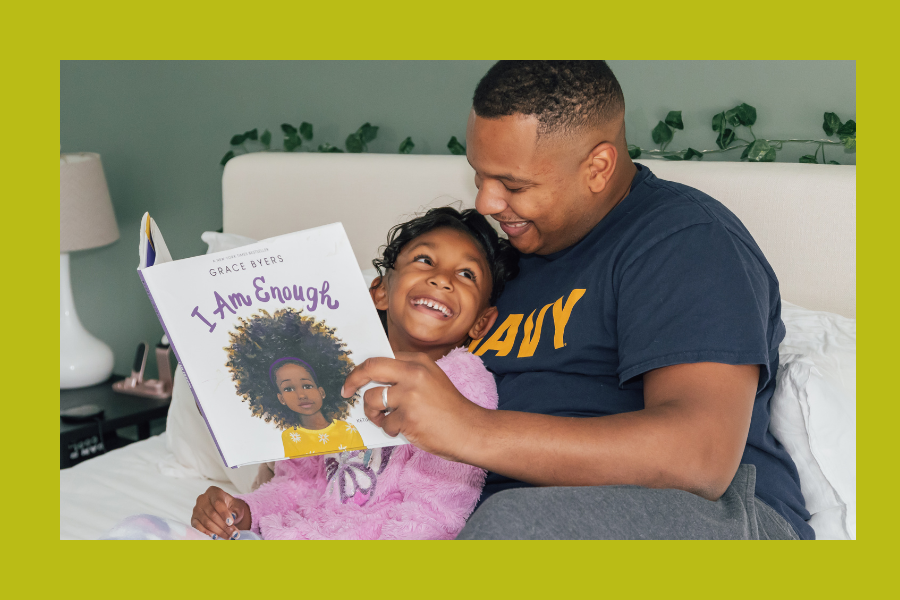
The Incredible Impact of Reading Aloud to Children
October 23, 2023
Reading aloud to children is one of the best things you can do for their development. Not only is it fun, but it is also a bonding experience that can impact their literacy skills, emotional well-being, and love of reading. Studies have shown that children who know more words when they enter kindergarten tend to read better and have higher academic achievement throughout school. Children who are read to more often are exposed to more new words and develop a more robust understanding of language. A 2019 study by The Ohio State University found that young children whose parents read to them five times daily will hear nearly 1.5 million more words by the time they turn five than children who were not read to at all. This is known as the “million-word gap.”
The study also found that children who are read to once or twice a week will have heard 63,570 words, while children who are read to three to five times a week will have heard 169,520 words. Children who are read to daily will have heard 296,660 words. This is important because vocabulary development is a crucial predictor of reading comprehension and academic success. Children with a more extensive vocabulary are better able to understand what they are reading and learn new information more easily.
For National Read Aloud to a Child Week, we put together this list of 11 benefits of reading aloud to children:
Builds vocabulary: Children learn new words when they hear them read aloud. The more words they know, the better they will be able to communicate and learn.
Improves comprehension: Reading aloud helps children develop their comprehension skills. They learn to follow along with a story, understand the characters and plot, and make predictions about what will happen next.
Promotes literacy: Reading aloud exposes children to different types of books and authors. It also helps them develop a love of reading, which is essential for success in school and beyond.
Develops attention skills: When children listen to a story being read aloud, they must pay attention to the words, the illustrations, and the narrator’s voice. This helps them develop their ability to focus and sustain attention.
Develops memory skills: When children listen to a story, they must remember the characters, the plot, and the setting. This helps them to develop their short-term and long-term memory skills.
Develops problem-solving skills: Many stories involve characters who face challenges and problems. Children can learn how to solve problems by listening to how the characters in the stories solve their problems.
Develop critical thinking skills: Children can learn to think critically about the stories they hear by asking questions about the characters, the plot, and the setting. They can also learn to evaluate the stories and form opinions about them.
Develops imagination: Stories can transport children to new worlds and introduce them to new ideas. This helps to spark their imaginations and creativity.
In addition to these general benefits, here are some specific ways military families benefit from reading aloud to children:
Reduces stress and anxiety: Reading aloud is a calming and relaxing activity that can help reduce stress and anxiety in children. This is especially important for military children, who may be dealing with the stress of a parent’s deployment or other challenges.
Provides a sense of routine and comfort: Reading aloud is a familiar activity they can look forward to each day, which is important during a time of change and uncertainty.
Strengthens the bond between parent and child: Reading aloud is a great way for military parents to stay connected with their children during time apart.
How to Make the Most of Reading Aloud
To make the most of reading aloud to your child, here are a few tips:
- Choose books that you and your child enjoy. This will make the experience more fun for both of you.
- Take your time and let your child enjoy the pictures. This is a great way to bond with your child and help them develop their appreciation for art and literature.
- Read with enthusiasm and expression. This will help your child engage with the story and understand the characters and plot.
- Ask your child questions about the plot of the story. This will help them develop comprehension skills and predict what will happen next.
- Ask your child ‘feelings’ questions about the thoughts and emotions the characters might have. This will help develop emotional intelligence and empathy.
United Through Reading is committed to helping military families stay connected and benefit from reading aloud to their children. With our free app, deployed parents can record themselves reading a book to their child, and the child can listen to the recording at any time. We also send new, quality copies of the book back home so the child can read along. This also helps families build a home library. A study by the University of Nevada, Reno, found that, when they become adults, children who grow up in homes with at least 80 books have significantly higher literacy, numeracy, and technological skills than those who grow up in homes with few or no books.
Through Operation Storytime’s Mission READ, we are committed to helping military families read together every day, no matter the distance. Learn how you can be part of #TheNextMillion, either by starting or maintaining your daily reading routine or supporting our military-connected families, at utr.org/operationstorytime
This article was written with the assistance of artificial intelligence.
